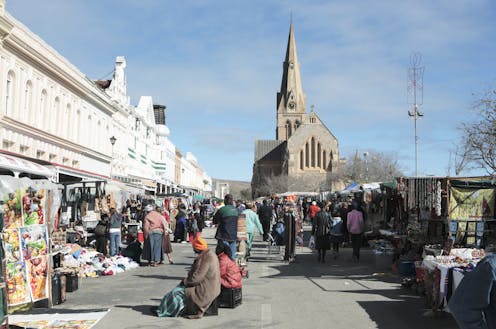
The South African informal economy accounts for 17% of employment. Street trading is the largest. Street traders are scattered around the many corners of the country’s towns and cities. They sell a vast range of products.
Despite the significant role they play in economic and social development, street traders continue to be harassed by municipal officials. They face sustained forceful evictions, incessant confiscation of their goods, and the soliciting of bribes by police officials. These actions are indicative of the repressive relationship between the street traders and local government in South Africa.
The justification is often that street trading is unruly, chaotic, and disruptive, driving municipal authorities to forcefully remove and relocate street traders.
The issue has ended up before the country’s courts, including the Constitutional Court. The cases have included the unlawful confiscation of goods belonging to traders, the removal of street traders from their stalls and their arrest. But as the Constitutional Court has pointed out the ability of people to earn money and support themselves and their families is an important component of the right to human dignity.
Fulcrum of development
We explored these issues in recent research on street trading and local economic development in South Africa. We found that a relationship of mutual understanding between street traders and local authorities would help advance local economic development. We argue that the informal sector constitutes the fulcrum of local economic development.
Local economic development is a process through which municipal authorities, community-based organisations, and local communities stimulate economic activity to create employment. It involves building on the resources of a local area. These include human, capital and institutional resources.
South Africa’s constitution mandates municipalities to drive local social and economic development. The mandate is fleshed out in the White Paper on Local Government and the Municipal Systems Act.
This effectively commands municipalities to forge relationships that can help them improve the livelihood of local communities. It also empowers municipalities to use legislative and other means to create environments that enable formal and informal businesses to thrive.
Local economic development can therefore be a tool for facilitating the growth of local economies, the creation of employment, and the reduction of poverty. And street trading can arguably help achieve these objectives. More so with rising unemployment in South African.
In addition, street trading is widely regarded as a “safety net” against poverty.
Principles, rights and duties
We argue that the principles, values, rights and duties embedded in the Constitution are directly relevant to the advancement of the street trading as a tool for local economic development.
The principle of constitutionalism for instance, states that the regulatory powers, duties, and functions of municipalities are derived from and also limited by the Constitution.
This means that all the instruments such as bylaws that municipalities use to regulate street trading must comply with the Constitution. In practical terms, the conduct of every municipal official must always be informed by the Constitution.
But a review of some of the actions against street traders contradict the values, rights and duties set out in the Constitution. This has been confirmed by various high and constitutional court rulings.
Constitutionalism suggests that city authorities must balance the development and enforcement of regulatory instruments such as bylaws or municipal policies against the rights of street traders. These include the right to dignity, freedom of trade and occupation, property rights as well as access to information and the courts. These rights are all reinforced by the constitutional principles of legality, human dignity and equality.
Constitutionalism also requires that city authorities ensure that their powers and duties in regulating the informal sector are aligned with established constitutional principles. These include legality and the rule of law.
Constitutional compass
Our research shows that there is merit in adopting a constitutional law approach to street trading. The constitutional compass would allow the sector to thrive. In turn this would help strengthen local economies.
For the authorities, the constitutional compass serves as a barometer for the conduct of officials.
It also dictates that the development, implementation and enforcement of local laws and policies should follow a more humane approach, grounded on the values of the Constitution. This requires an overhaul of rigid and callous local laws and policies that fall short of the humane constitutional approach.
In our view, street traders would be guaranteed a range of constitutional rights if local authorities complied with the dictates of the Constitution. This would enhance their ability to trade and help promote local economic development.
On the other hand, street traders should respect local laws and policies that are constitutionally compliant. This is in line with the governing powers of municipalities.
Nonhlanhla Ngcobo is a PhD Researcher of the NRF South African Research Chair in Cities, Law and Environmental Sustainability (CLES) at the North-West University. This research was partly funded by the National Research Foundation (NRF) (Grant number:115581). All viewpoints and errors are the authors' own.
Anél du Plessis is the incumbent of the NRF South African Research Chair in Cities, Law and Environmental Sustainability (CLES) at the North-West University. This research was partly funded by the National Research Foundation (NRF) (Grant number: 115581). All viewpoints and errors are the authors' own.
Oliver Fuo works for: The North-West University, South Africa
This article was originally published on The Conversation. Read the original article.







